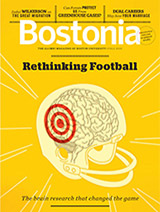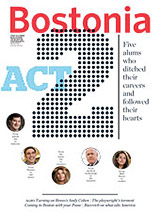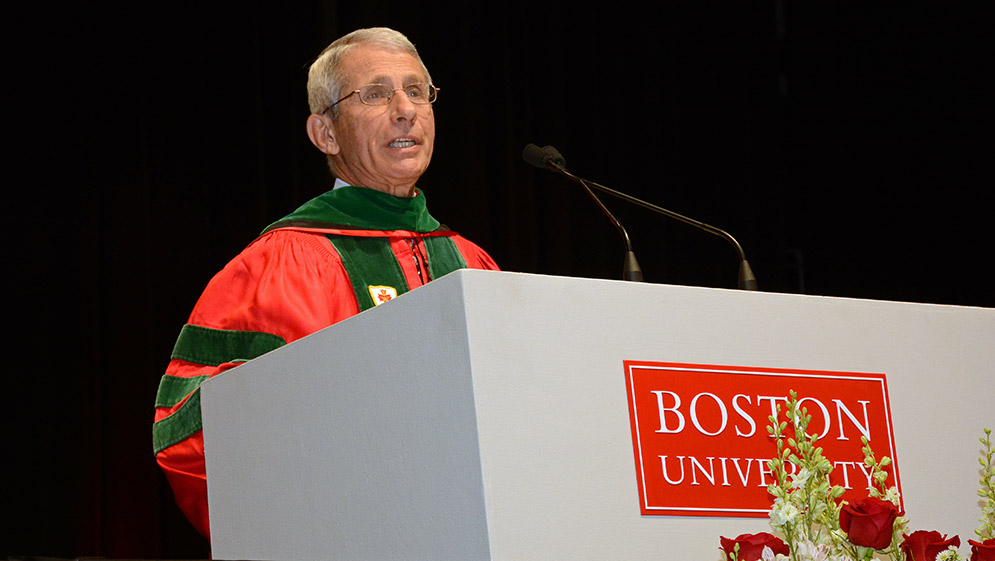Renowned infectious diseases expert Anthony S. Fauci urged the 2017 School of Medicine graduates at their Convocation ceremony on May 18 to maintain the US medical leadership role in a world grappling with critical challenges that transcend borders.
“It is so apparent now, as we come to the end of the second decade of the 21st century, that we live in a global community,” said Fauci, director of the National Institute of Allergy and Infectious Diseases (NIAID), who is known for his work on preventing the spread of AIDS. “Linkages exist between what happens here in the United States and throughout the world, be it with regard to the environment, security, finance, and indeed, health.”
Families, friends, and faculty were gathered at Agganis Arena, where Fauci told the graduates, both medical doctors and those receiving master’s degrees and PhDs from the school’s Division of Graduate Medical Sciences, that the United States is clearly the world’s leader in the field of medicine and the biomedical sciences, and that it would be up to them to lead by example in their clinical work, research, teaching, and public health and administrative work.
“Your generation of physicians and biomedical scientists will serve as the gold standard for the rest of the world,” he said. “We cannot relinquish this leadership role. Health and biomedical research are by definition global. We are not alone. I appreciate that it is difficult for you to think of yourselves in this context at this early stage in your career. However, it is unquestionably the case.”
Fauci, who has been NIAID director since 1984 and oversees a $4.7 billion budget, received the Presidential Medal of Freedom in 2008 for his work, work that includes being instrumental in developing the President’s Emergency Plan for AIDS Relief (PEPFAR), credited with saving millions of lives in developing countries.
“Your generation of physicians and biomedical scientists will serve as the gold standard for the rest of the world.” —Anthony S. Fauci
He noted that when he finished his medical residency in 1968, top public health officials at the time, buoyed by advances in antibiotics and vaccines, were ready to declare victory over infectious diseases. Subsequent outbreaks and epidemics—such as AIDS, SARS, Ebola, and Zika—demonstrate the kind of unforeseen challenges graduates will encounter.
“Not every change, evolution, or advance in medicine or in the life and medical sciences will be as dramatic or as draconian as a frightening infectious disease outbreak,” he said. “However, please believe me that the same unpredictable elements in the evolution of public health, medicine, and biomedical science are going to confront each and every one of you regardless of what specialty or subspecialty of medicine you pursue or what particular area of biomedical science you enter.”
In this sense, Fauci said, the graduates receiving doctorates are starting the next phase of their educations. Many will develop a nagging feeling of inadequacy for never knowing as much as they feel they need to know. “You can’t be immobilized by this potentially disturbing concept. And you should certainly experience fully the joys of life. In other words, don’t forget to have some fun,” he said. “On the other hand, it should create a healthy, positive, and productive tension whereby you never feel completely comfortable. It is this tension that can actually serve as a catalyst to consistently improve yourself and fulfill what we know is your enormous potential.”
Karen H. Antman, dean of MED and provost of the Medical Campus, presided over the ceremony and echoed Fauci’s expectation that the graduates will continue to learn.
“The diploma that you get today is the credential that grants you entry to the next stage of your education. Residency for MDs, postdocs for PhDs,” Antman said, noting that the graduates are entering a field of both great discoveries and uncertainties, like the Ebola and Zika viruses, as well as rising numbers of refugees around the world. “We hope that you will become leaders who solve these problems. The faculty have great confidence in your creativity, resilience, intellect, and innovation. You wouldn’t be here if you hadn’t convinced our admissions officers that you wanted to change the world at the front lines of medicine and science.”
Se
The MED grads leave BU with the tools to succeed. “How to ask questions. How to think critically. How to turn the unknown into the known. We figured it out. As for the unknowns of the future, these are what we excel at.” —Elizabeth Moses (MED’17)
Two students were chosen by their classmates to speak at the Convocation.
“My classmates constantly remind me that the raw materials for building a great physician are present in all of us. They teach, support, listen to, impress, and humble me in countless ways, far beyond what I expected. The residency programs that have welcomed you into their fold are very lucky,” said Samuel Miller (MED’17), who is headed to an internal medicine residency at Massachusetts General Hospital.
Elizabeth Moses (MED’17), an immunology researcher who focuses on airway gene expression and environmental exposures, told fellow GMS grads that even as they inevitably struggled during their studies, they leave BU with the tools to succeed. “How to ask questions. How to think critically. How to turn the unknown into the known. We figured it out. As for the unknowns of the future, these are what we excel at,” she said.
Linda E. Hyman, associate provost for GMS and a MED professor of microbiology, said students who participated in the March for Science, held April 22 in Boston and other cities to support public funding for science research, were another sign of the graduates’ readiness.
“It was so reassuring recognizing that you, as the next generation of doctors, scientists, clinicians, or both, are so committed to evidence-based, data-driven decision-making. And that, importantly, you are committed to getting the word out to the public,” Hyman said.
Michael S. Goldberg can be reached at michaelscottgoldberg@gmail.com.














































Related Stories
MED Physicians among Boston’s Top Docs
Boston magazine’s annual list includes 68 faculty
Four MED Profs Earn Top Honors
Recognized for teaching, mentorship, and medical expertise
Five BU Medical Campus Faculty Honored by Peers
Elected fellows by the American Association for the Advancement of Science
Post Your Comment